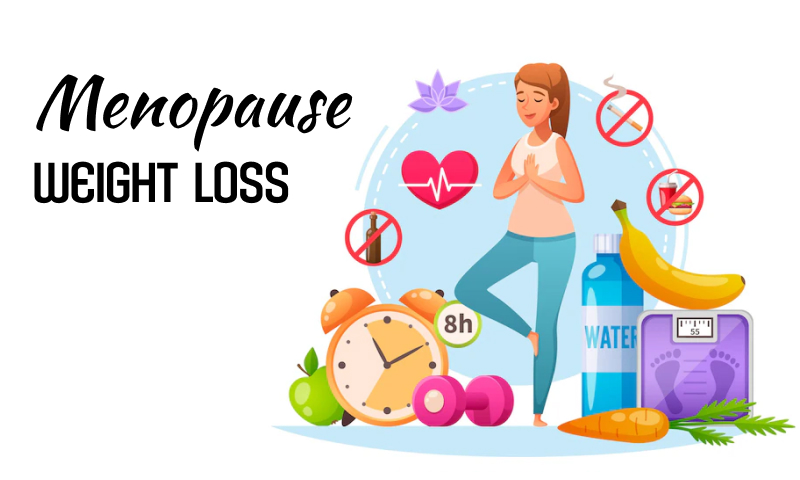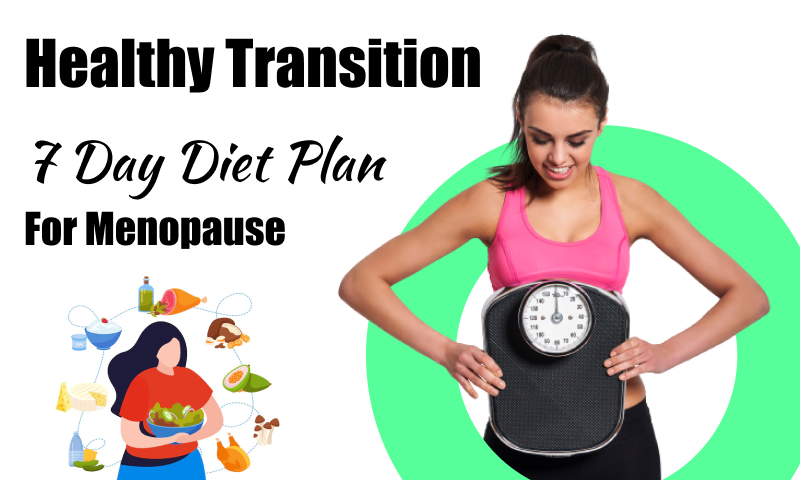Navigating menopause often involves making adjustments to support your body’s changing needs. A balanced diet is crucial during this phase, helping manage symptoms and promote overall well-being. This 7 day diet plan for menopause focuses on nourishing, whole foods rich in nutrients that can help ease menopausal symptoms. By incorporating a variety of fruits, vegetables, lean proteins, and healthy fats, this plan aims to provide a foundation for maintaining health and vitality during menopause.
What is Menopause?
Menopause is a natural biological process that occurs in women around their late 40s or early 50s, although it can vary. It signifies the end of a woman’s fertility and menstrual cycle. During menopause, the ovaries produce fewer hormones, estrogen and progesterone, leading to the cessation of menstruation. Symptoms of menopause can include hot flashes, night sweats, mood changes, vaginal dryness, and changes in sleep patterns.
The Significance of Diet in the Menopause
Diet can have a significant impact on how the menopause occurs. Menopause-related hormonal changes have various effects on the body; they can be managed with a healthy diet.
It related to diet and menopause in the following ways:
- Weight management: Maintaining weight when estrogen levels drop. It can be not easy. A diet high in nutrients and well-balanced can help stop weight gain.
- Bone Health: The disorder known as osteoporosis, characterized by weak bones, is more common in women. Eating a diet rich in calcium and vitamin D can strengthen bones and lower the chance of fractures.
- Heart Health: In premenopausal women, estrogen helps to maintain heart health. Cardiovascular disease risk rises after menopause. Thus, emphasizing a diet high in fruits, vegetables, and whole grains and low in saturated fat can help lower this risk.
- Mood and Emotional Health: Hormonal changes can bring mood swings, irritability, and anxiety during menopause. The brain benefits from a healthy diet of B vitamins and omega-3 fatty acids.
Foods to Avoid on a Menopause Diet
These unhealthy foods lead to weight gain, hot flashes, and restless nights.
Among them are:
- Foods with added sugar: We have found women going through menopause experience more hot flashes when their blood sugar levels are high.
- Caffeine and alcohol: Studies on women going through menopause have shown that alcohol and caffeine can cause hot flashes.
- Foods high in salt: postmenopausal women are more likely to develop osteoporosis. A study found that eating over 2 grams of salt daily, or foods high in sodium and salt, increased the risk of low bone mineral density by 28%.
Simplified 7 Day Diet Plan For Menopause
Day 1
Breakfast: Berries, Greek yogurt, and a small amount of nuts
Snack: Carrot sticks with hummus
Lunch: Avocado, mixed greens, and vinaigrette dressing paired with grilled chicken salad
Snack: Apple slices with almond butter
Dinner: Baked salmon with roasted vegetables (broccoli, bell peppers, and cauliflower)
Day 2
Breakfast: Oatmeal topped with sliced bananas and walnuts
Snack: Plain yogurt with sliced peaches
Lunch: Quinoa and black bean salad with tomatoes, cucumbers, and a lime-cilantro dressing
Snack: Mixed berries smoothie (made with almond milk or yogurt)
Dinner: Brown rice and mixed vegetables with stir-fried tofu
Day 3
Breakfast: spinach-filled scrambled eggs served with whole-grain toast
Snack: Cottage cheese with pineapple chunks
Lunch: Turkey wrap with whole-grain tortilla, lettuce, tomatoes, and avocado
Snack: Handful of mixed nuts
Dinner: Grilled shrimp with asparagus and quinoa
Day 4
Breakfast: Whole-grain cereal with low-fat milk or almond milk and sliced strawberries
Snack: Celery sticks with peanut butter
Lunch: Lentil soup with a side salad (mixed greens, cucumber, and vinaigrette dressing)
Snack: Orange slices
Dinner: Steamed broccoli, roasted sweet potatoes, and grilled chicken breast
Day 5
Breakfast: Smoothie bowl with spinach, banana, berries, and a sprinkle of chia seeds
Snack: Edamame beans
Lunch: Tuna salad with mixed greens, olives, and a light dressing
Snack: Yogurt with a handful of granola
Dinner: Baked cod with quinoa and roasted vegetables
Day 6
Breakfast: Avocado smashed on whole-grain toast with a poached egg
Snack: Pear slices with cheese
Lunch: Veggie stir-fry with tofu or chicken and brown rice
Snack: Trail mix of nuts, seeds and dried fruits
Dinner: Grilled steak with roasted Brussels sprouts and a mixed green salad
Day 7
Breakfast: mushroom omelette & spinach with a whole grain toast
Snack: Sliced bell peppers with hummus
Lunch: Chicken or chickpea salad with mixed vegetables and a light dressing
Snack: Cottage cheese with berries
Dinner: Baked tilapia with quinoa and steamed green beans

Conclusion
This 7 day diet plan for menopause plan for menopause aims to offer a blueprint for incorporating nutrient-dense foods that may aid in alleviating menopausal symptoms. However, individual needs differ, so adapting this plan to suit personal preferences and consulting a healthcare professional or a registered dietitian for personalized guidance can be instrumental. Embracing a balanced diet alongside a healthy lifestyle can contribute to navigating menopause with greater ease and well-being.
**Also Read** – Lose weight after pregnancy guides
FAQS
What foods should I include in a menopause diet?
Focus on whole grains, fruits, vegetables, lean proteins, and healthy fats like avocados and nuts.
Are certain foods to be avoided during menopause?
You should avoid alcohol, caffeine, processed foods, and sugary snacks, as they may worsen symptoms.
When should I eat each day?
Aim for 3 balanced meals and 1-2 healthy snacks to maintain stead
